Hire officers? Abolish the police? L.A.’s election reveals deep divisions over the LAPD
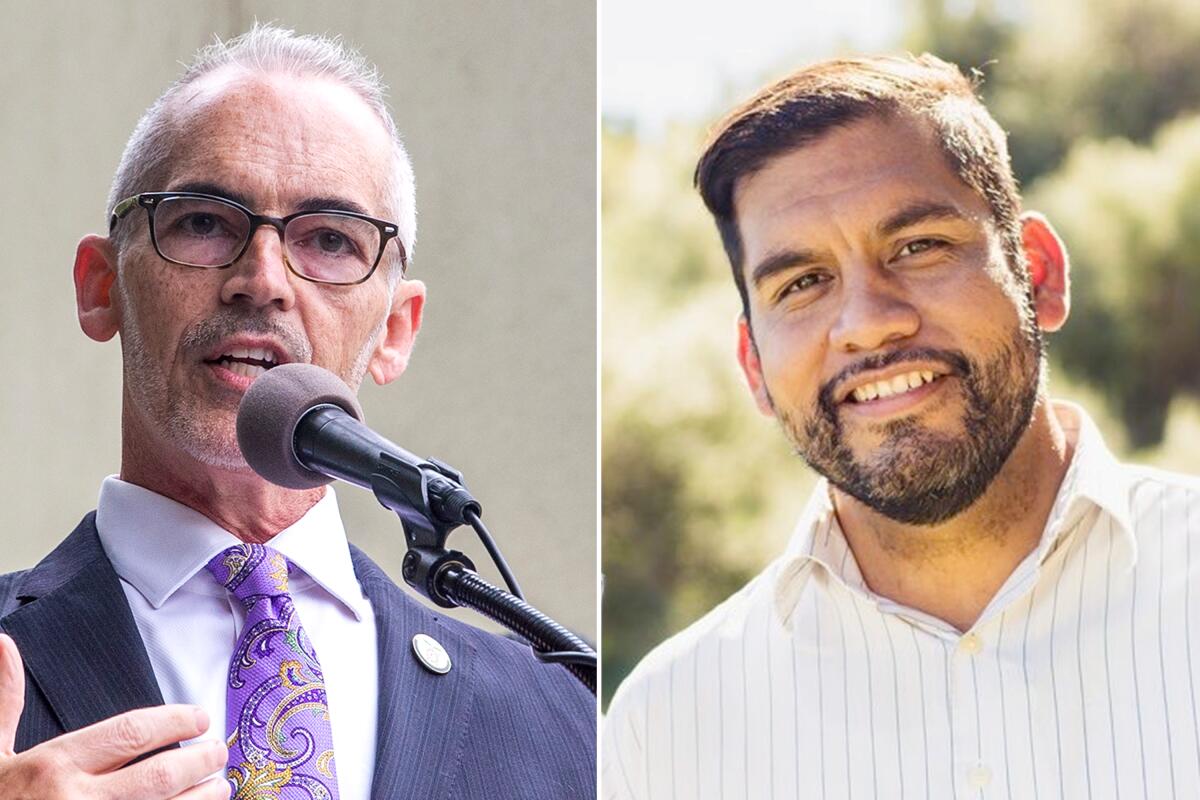
- Share via
When community activist Eunisses Hernandez ran for a seat on the Los Angeles City Council this year, she made clear she thinks L.A. needs fewer police.
The Highland Park resident promised to oppose the hiring of new officers at the LAPD, even to replace those who retire, saying the savings should be redirected into community services. On the issue of policing and prisons, she described herself as an abolitionist.
“I do not believe,” Hernandez said in one candidate questionnaire, “that the police should play any role in my community.”
Hernandez defeated Councilmember Gil Cedillo in an Eastside district that extends as far as Pico-Union. Since then, she’s been promoting her favored candidates in the Nov. 8 election, in hopes of building a bloc of like-minded progressives at City Hall.
Hernandez endorsed Hugo Soto-Martinez, a labor organizer who, like Hernandez, has described himself as an abolitionist. Soto-Martinez is running to unseat Councilmember Mitch O’Farrell in a Hollywood-to-Echo Park district.
Hernandez is also backing Erin Darling, a civil rights lawyer running to replace Councilmember Mike Bonin on the Westside. And she has talked up neighborhood leader Danielle Sandoval, who is seeking to represent a Watts-to-San Pedro district.
If elected, those three candidates could have a major say on spending decisions at the LAPD, which consumes more than $3 billion per year, or nearly 30% of the city budget. They could draw a harder line on upcoming contract talks with the Los Angeles Police Protective League, the powerful police union, which has endorsed their opponents.
Meanwhile, two other contenders — city attorney candidate Faisal Gill and city controller candidate Kenneth Mejia — have promised to apply much greater scrutiny to the LAPD, which had a major increase in fatal police shootings last year.
“I think it’s been time we audit every LAPD position to see what each officer exactly does,” Mejia wrote last year.
With the election a few days away, several of the opponents of those candidates have been attempting to draw sharp contrasts on crime and safety.
O’Farrell, appearing at a candidate forum last week, highlighted Soto-Martinez’s statement — made earlier this year — that he would seek to replace every officer who leaves the department with twice as many mental health professionals or other unarmed workers, ultimately shrinking the LAPD. O’Farrell also noted that Soto-Martinez listed himself as an abolitionist, someone who favors “abolition of police and the prison industrial complex,” on a questionnaire submitted to the L.A. chapter of the Democratic Socialists of America.
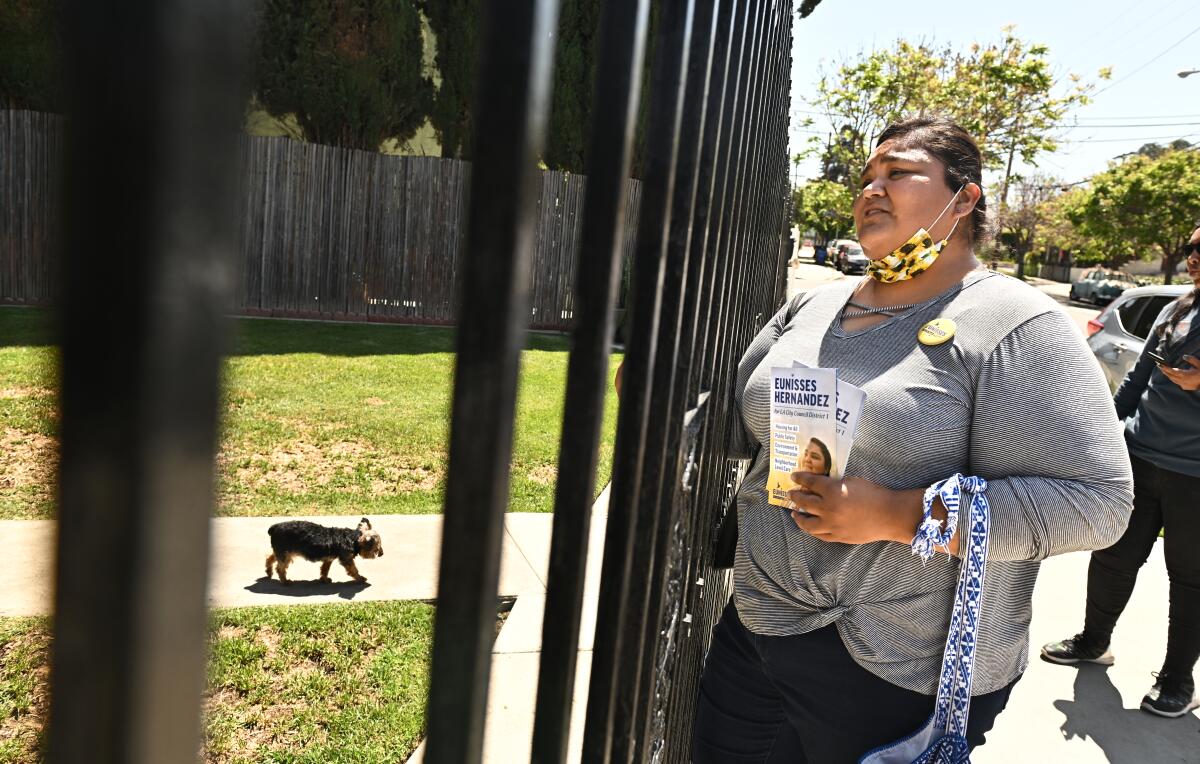
“My opponent wants to abolish police. He checked the box,” O’Farrell said during the forum, held at the Pantages Theater. “That is naive and it’s dangerous.”
O’Farrell, backed by the L.A. County Democratic Party, favors shifting some duties out of the LAPD, and said he already has mental health teams assigned to his district, reducing the city’s reliance on law enforcement. But he said the city also needs additional police to prevent a return to the ‘90s, when crime was considerably higher.
Soto-Martinez, for his part, has been telling voters that being an abolitionist does not mean he has called for the complete elimination of the LAPD. But he said the city could see faster response times if it brought on unarmed responders — addiction counselors, mental health experts — to handle non-violent mental health calls.
“I don’t think we should be spending $135,000 per police officer that, when you call, show up three, four hours later,” he said at the Pantages. “They don’t respond to calls, and I think that money should be better used.”
(A police officer who has just completed their 12-month probation period currently costs the city $173,000 annually in salary and benefits, according to City Administrative Officer Matt Szabo.)
Soto-Martinez said the department should keep the officers it has — there are currently fewer than 9,300 — until the community has engaged in a process for finding “cheaper and more effective alternatives” to police.
“With the police union, yes, I will be very hard on them, because I don’t think that is the best way to spend our dollars,” he said at last week’s forum. “And I think most people agree.”
The debate over police spending comes at a turning point for the city. The LAPD has already lost nearly 8% of its officers. Burglaries are up 13% this year, according to police statistics, while robberies have increased 14%.
Homicides, on the other hand, have declined a bit, after reaching a 15-year peak last year.
At the same time, council members have begun examining alternatives to traditional policing.
Hernandez, who takes office in December, said she visited several cities that have embraced alternatives to traditional law enforcement, hiring behavioral health clinicians and other unarmed responders. She said she plans to educate her colleagues on those “proven alternatives” to police.
“We have a public mandate to reevaluate how our local government invests in safety,” she said.
Two months ago, Hernandez was the special guest at a campaign fundraiser for Soto-Martinez and Darling, who is running on the Westside. In Darling’s race, the police union has gone all out for candidate Traci Park, sponsoring a political action committee that has spent more than $1.2 million on Park’s behalf during the runoff campaign.
Park, a lawyer who lives in Venice, has decried the recent drop in LAPD staffing and called for the city to return to 10,000 officers. She contends that her opponent is supported by activists and organizations who favor police abolition, a stance she calls “reckless.”
“We all want our police engaging in constitutionally based best practices and ... serving the needs of our very diverse city,” she said. “But the thought of abolishing police, when we’re seeing crime at their highest levels in more than a decade, is scary.”
Darling, in an interview, said he is not an abolitionist. He accused Park of engaging in “guilt by association,” focusing on one set of his supporters while ignoring the many Democrats across the district who have endorsed him, including state Sen. Ben Allen and Rep. Maxine Waters.
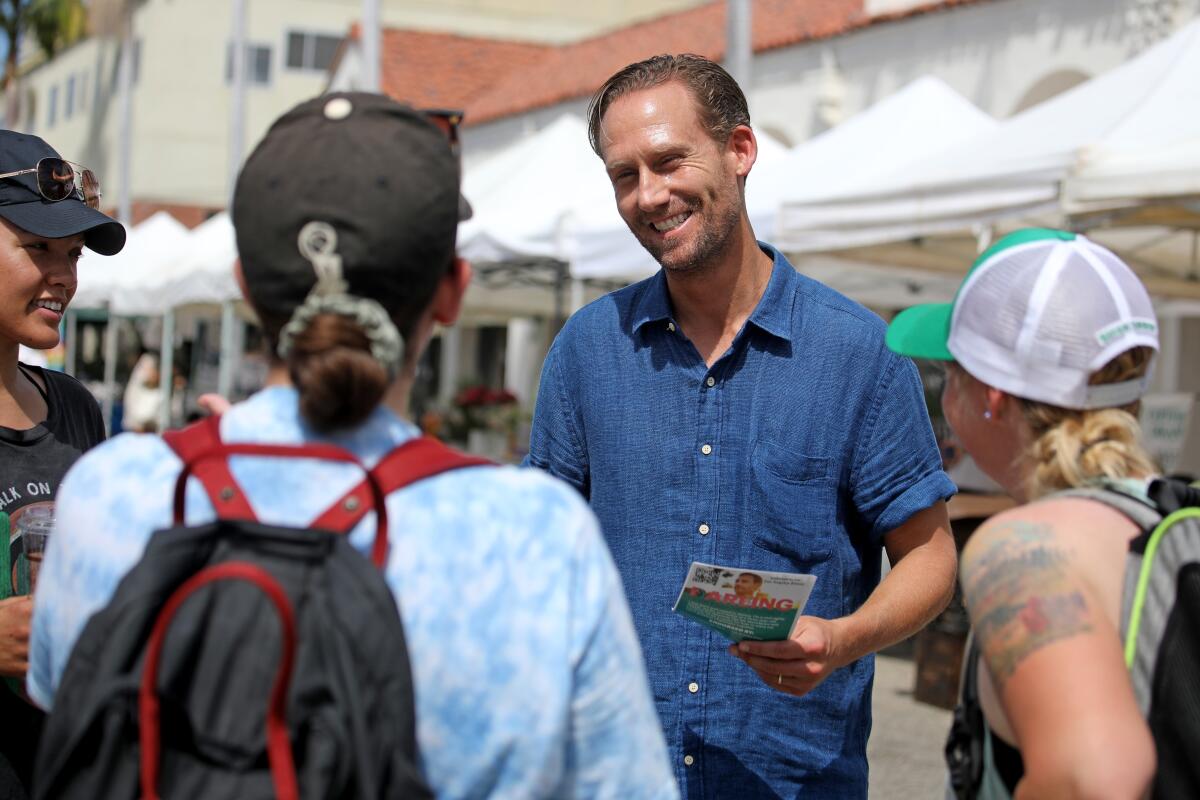
Homelessness, not the LAPD budget, is the issue voters want to discuss at their front door, Darling said.
“This race is not about policing or the police budget,” he said. “This race is about housing and homelessness, and whether we’re going to strengthen renter protections to keep people in their homes and whether we create units to get people inside.”
Park and Darling have offered different takes on the council’s decision in 2020 to cut police spending by $150 million. Park portrayed that move as a “defunding,” saying it triggered the decline in staffing.
Darling, in a 2020 Instagram post, called the reduction a step in the right direction. In an interview, he said it’s premature for him to say how much money the LAPD should receive.
The issue of public safety has also spilled into the race to replace Councilmember Joe Buscaino in L.A.’s harbor district. Tim McOsker, who is backed by the police union and also served as the group’s lawyer, said he wants to reverse the decline in police staffing. He has also sent campaign mailers highlighting what he said are contradictory positions taken by Sandoval, his opponent.
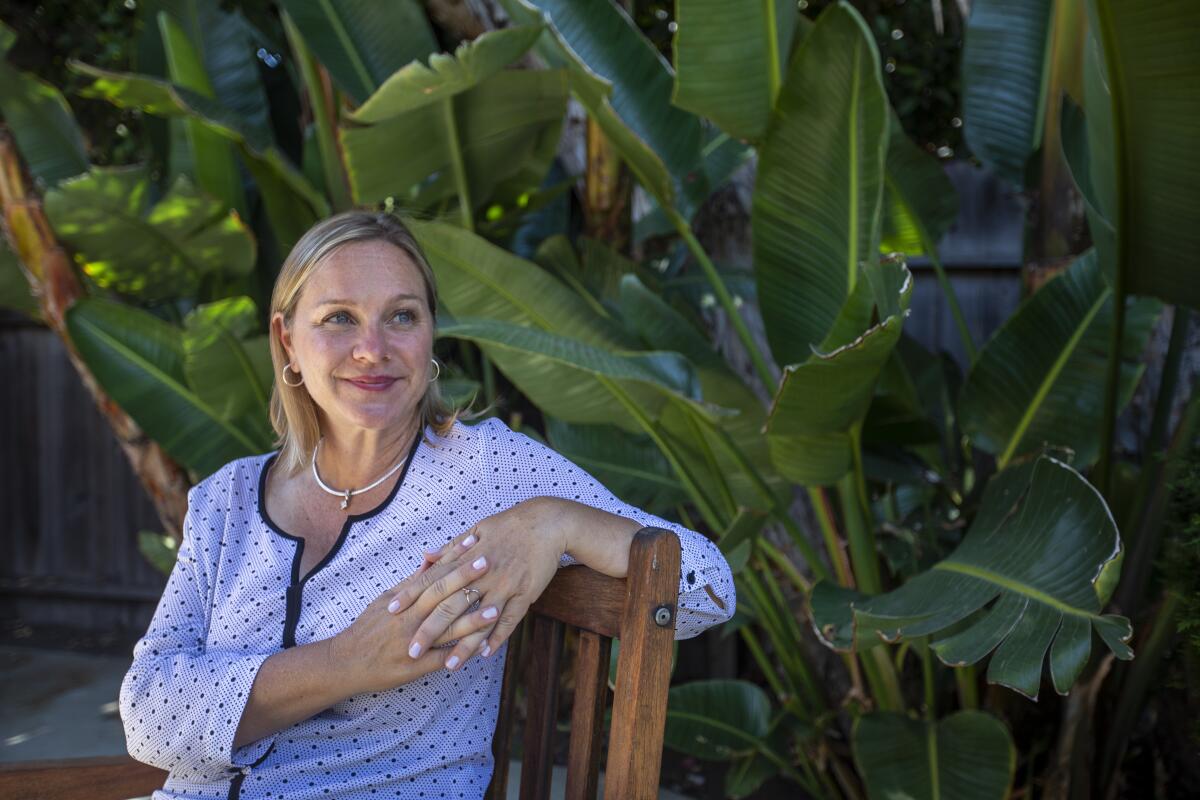
Two years ago, Sandoval voted with the Harbor City Neighborhood Council to support the People’s Budget, which outlined deep cuts to the LAPD. Several months earlier, she voted with the Neighborhood Council Budget Advocates to recommend the hiring of additional police, the mailer said.
Sandoval “will say whatever she thinks will get her ahead,” McOsker’s mailer says.
Rick Thomas, a Sandoval spokesman, said Sandoval does not want to reduce LAPD staffing — and in fact wants more patrols. Sandoval also has been touting her endorsement from David Gascon, a retired LAPD assistant chief who described her as “pro-police.”
“I would never support anyone that supports the defund the police movement in any way,” Gascon said. “Anyone who thinks that is likely an anarchist, a revolutionary and a Marxist.”
The issue of public safety has been potent in two other down-ballot contests — city attorney and city controller.
Gill, the city attorney candidate, has promised to disrupt what he called the “culture of impunity” at the LAPD, saying he would create an independent team in the city attorney’s office to investigate the department and determine whether it is complying with local, state and federal laws.
Gill said that office would be “walled off” from city lawyers who are charged with defending the department against lawsuits.
“I want to make sure the LAPD is being held accountable, and I don’t think the current city attorney has done that,” he said in an interview.
Former Dist. Atty. Steve Cooley panned Gill’s idea, saying it would conflict with the city attorney’s duty to defend city employees in lawsuits. That conflict could disqualify Gill from handling either matter, said Cooley, who served from 2000 to 2012.
“He’s making a promise he can’t keep,” Cooley said.
The future of policing also looms large in the race to replace City Controller Ron Galperin.
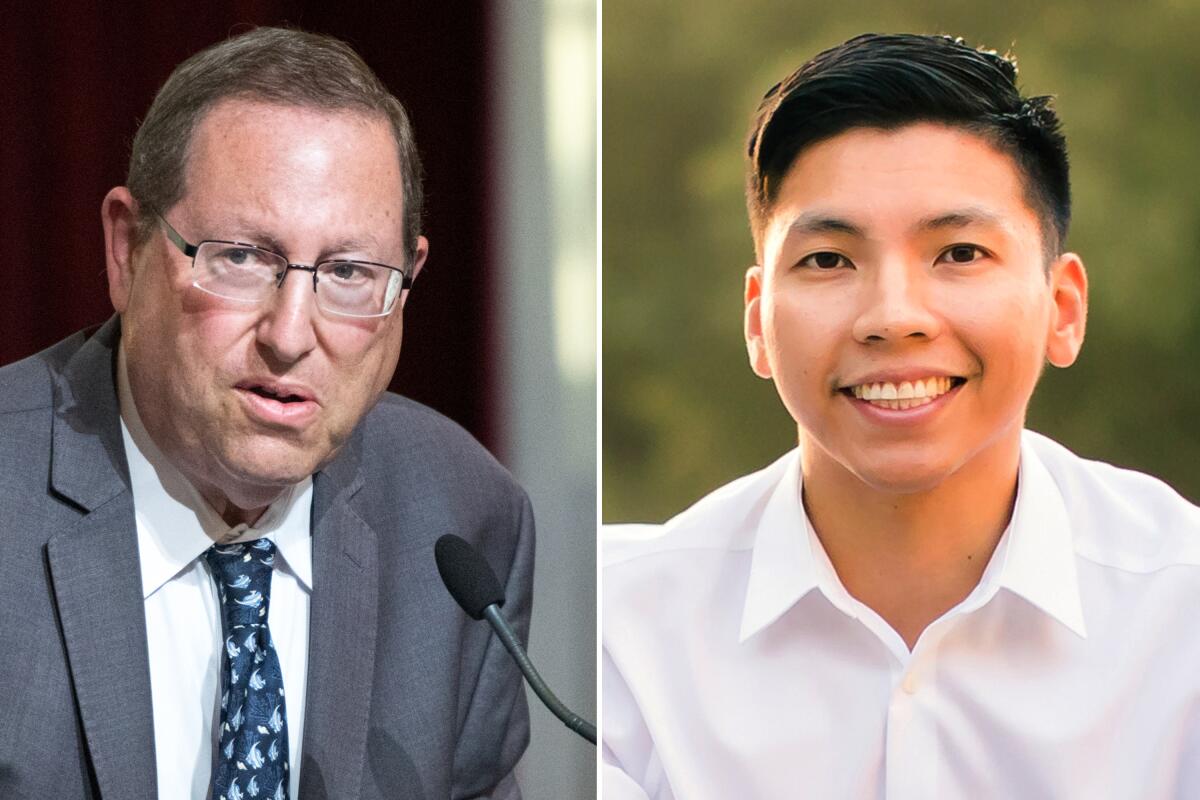
Mejia, an outspoken LAPD critic, has called for an array of audits targeting the agency over police overtime, surveillance operations and fatal police shootings. In one tweet, he suggested the controller’s office review body camera footage to determine whether officers have been truthful.
“We need to audit and watch all body worn videos of the police and connect it to the reports that they filed,” he said.
Mejia did not respond to inquiries from The Times. Councilmember Paul Koretz, who is running against Mejia, said he believes the LAPD should be audited to find ways it can operate more efficiently and effectively.
Still, he questioned whether reviews of body-cam video fall outside the controller’s mission.
“His No. 1 goal as controller will be to torture the LAPD in every way that’s conceivable,” Koretz said. “If that’s what people are looking for, then they should probably vote for him.”
More to Read
Sign up for Essential California
The most important California stories and recommendations in your inbox every morning.
You may occasionally receive promotional content from the Los Angeles Times.











